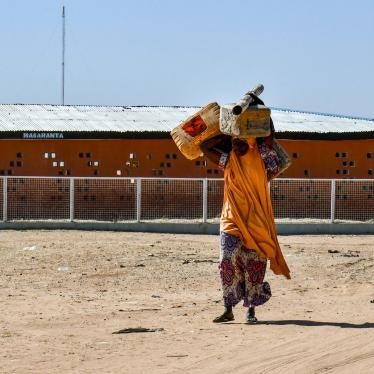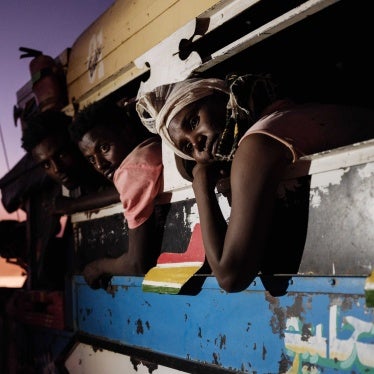(New York) - The rebel Democratic Forces for the Liberation of Rwanda (FDLR) brutally slaughtered at least 100 Congolese civilians in the Kivu provinces of eastern Democratic Republic of Congo between January 20 and February 8, 2009, Human Rights Watch said today.
Human Rights Watch researchers interviewed dozens of victims and witnesses who recently arrived from neighboring areas of Ufamandu and Walowaluanda (North Kivu province) and from Ziralo (South Kivu province) at displaced persons camps near Goma, the capital of North Kivu. Their accounts are the first reports of killings of civilians by the FDLR since joint operations between Rwandan Defense Forces and the Congolese army against the group began on January 20. Some of the civilians died during the fighting between these forces.
"The FDLR have a very ugly past, but we haven't seen this level of violence in years," said Anneke Van Woudenberg, senior researcher in the Africa division at Human Rights Watch. "We've documented many abuses by FDLR forces, but these are killings of ghastly proportions."
The joint military operations are intended to dismantle Rwandan armed groups that have been present in eastern Congo since 1994. Some leaders of the FDLR are accused of having participated in the 1994 Rwandan genocide.
As Rwandan and Congolese coalition forces advanced toward the FDLR's former headquarters at Kibua, in Ufamandu, North Kivu, the FDLR abducted scores of local residents from neighboring villages and took them to their camp, apparently intending to use them as human shields against the impending attack. Witnesses said that when coalition forces attacked Kibua on January 27, the trapped civilians tried to flee. The FDLR hacked many civilians to death and others died in the crossfire.
One witness at Kibua saw FDLR combatants kill at least seven people, including a pregnant woman, whose womb was slit open. Another saw an FDLR combatant batter a 10-year-old girl to death against a brick wall.
As the FDLR fled the military confrontation, they abducted dozens of civilians, forcing them to carry their goods.
In Remeka village in Ufamandu, the FDLR rebels called a meeting at which they accused the population, local leaders and the Mai Mai armed group with whom they had been allied, of having betrayed them. A local resident present at the meeting said the FDLR told residents they would not be allowed to leave and that they were "sharpening their spears and machetes." Another said, "The FDLR told us that if they were shot at by anyone that they would hold us responsible and kill us."
Following the meeting, the FDLR erected barriers to prevent people from fleeing. When some tried to flee, the FDLR attacked them, killing dozens with guns, rocket-propelled grenades, and machetes. "As I ran, I saw bodies everywhere - men, women and children," said one witness. "They had all been killed by the FDLR."
FDLR combatants also raped more than a dozen women whom they accused of having joined the government side against them. For instance, in southern Masisi territory (North Kivu), on January 27, FDLR combatants raped and killed a woman and then raped her 9-year-old daughter.
The message given at the Remeka meeting was repeated in a letter sent from the FDLR to the governor of South Kivu in early February. In the letter, the group warned that if the local population collaborated with the Rwandan army they would be considered the FDLR's "mortal enemy" and treated as a "belligerent party."
Following the attacks in Ufamandu, FDLR forces fled through Walowaluanda in Walikale territory to the Ziralo region in South Kivu, where they continued to kill civilians. A woman from Lulere village in Ziralo told Human Rights Watch that the FDLR said they would not leave Congo without "first exterminating the Congolese people." The FDLR forces then killed her 73-year-old father and 80-year-old uncle by smashing their skulls with small hoes.
Witnesses told Human Rights Watch that FDLR forces abducted at least 50 civilians in early February in Lulere, Mianda, Kalingita, Katale, and Kirambo villages, on the border between North and South Kivu provinces. They were reportedly taken to Kinono forest in Ziralo, South Kivu. Their fate is unknown.
The Congolese government nominally leads the joint operations against the FDLR, but the coalition troops that attacked the FDLR in Ufamandu were largely soldiers from the Rwandan Defense Forces. These Rwandan soldiers were allegedly responsible for having raped several women since the start of operations against the FDLR.
"The Tutsi [Rwandan] soldiers accused me of being the wife of an FDLR combatant, just because I'm Hutu," said one woman who was raped by a Rwandan army soldier in Remeka. "After they raped me, they burned my house, saying it was the house of an FDLR. I was pregnant, but there's no more movement in my womb. I think I have lost my first child."
The United Nations Mission in Congo, MONUC, has a mandate to protect civilians and provides logistical support to the Congolese army, but it was not involved in planning the joint operation. Although the coalition forces say they are open to sharing information with MONUC about their campaign, such information-sharing has been scant and too late to permit the UN forces to be able to plan for providing the needed protection.
In November 2008, the UN Security Council authorized an additional 3,000 troops for the mission to help carry out its mandate to protect civilians. None of these additional troops have yet arrived.
International humanitarian law - the laws of war - applies to both states and non-state armed groups. Parties to a conflict must take all feasible steps to minimize harm to the civilian population, including permitting civilians to flee to safer areas. The laws of war prohibit murder, rape and abductions. Those who commit such acts are responsible for war crimes.
"Protection of civilians needs to be given a top priority in the military operations to help prevent, once again, Congolese civilians paying the highest price," said Van Woudenberg.






